| A Journey with Jayson
by Neil Figuracion
Part 1 – Coming Up and Coming Out
BROKEN FRONTIER: Jeff, you grew up in Amish Country…
JEFF KRELL: Well, not really. My character did. I grew up on the fringes of Pennsylvania Dutch Country, and used that as inspiration. We encountered some Amish people from time to time. I was not one of them. When you’re doing a comic strip you have very little space in which to make a point. You tend to broaden things. If I went through the whole explanation of where I came from, people would just be bored. So I made Jayson’s parents Amish because it was an extreme example of the kind of upbringing I had.
BF: I see. So what was it like coming up (and coming out) in a more conservative part of the country?
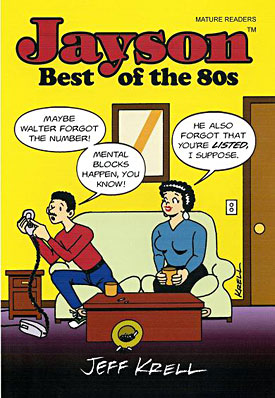
JK: I didn’t come out there. I moved to Philadelphia. I went to the University of Pennsylvania, which is where I met Andrea Jartman. She would be proud for me to use her name and let people know she was the inspiration for Arena Stage, who is Jayson’s fag-hag in the strip. She actually lived above Dirty Frank’s bar on 13th and Pine, which is where Jayson and Arena live. In reality, I lived about ten blocks away. I think I was too smart to move in with her because of all the conflicts that would have ensued - that I imagined instead and pursued in the strip. But we remained friends for a long time and visited each other. So there were many happy hours spent on her sofa in her efficiency apartment. That was one of the inspirations for the strip, but it wasn’t until I moved to Philadelphia and went to Penn that I came out.
I came out on Campus and to my friends before I came out to my parents. There’s one one-page strip that I did for the Philadelphia Gay News that was about me coming out to my parents. It was just six panels and that was pretty much based on reality. They had come to visit me in Philadelphia. It was after I had graduated college and had a job. It wasn’t much of a job, but I thought they’re poor and they were never gonna support me financially anyway. Well, what do I have to lose here? And I kind of got tired of keeping two rolodexes – who was I out to and who wasn’t I out to? I thought if this is gonna be a problem, let it be their problem. So they were visiting me, which they didn’t do very often, but I felt emboldened on this occasion. I had my own apartment and my own income and I wanted them to know the truth.
They didn’t deal well with it. My father said two unsurprising and completely contradictory things. He first said “I always knew” and then he said that it was a choice and I’d made the wrong choice. If he’d really thought about it, both of those things couldn’t be true. This was just his emotional reaction. My mother’s emotional reaction was just to cry.
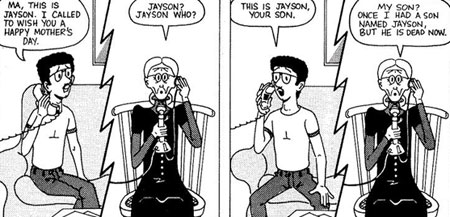
BF: That must have been tough.
JK: She probably thought it was her fault, or at least thought “what could I have done differently to prevent this from happening?” That answer, of course, is nothing.
We’re better now. It took about twenty years to get better.
BF: That’s good to hear.
JK: They love my partner, Bud. They love when we come to visit. My mother always includes him when she sends letters; always includes him on greeting cards. So he’s a part of the family. We had a commitment ceremony a few years ago. We live in Los Angeles – they still live on the fringes of Pennsylvania Dutch country, same house I grew up in. They didn’t come to the ceremony. In fact, I didn’t exactly invite them. I more like informed them it was happening. That way, they didn’t have to feel obliged to have to turn it down. They don’t travel, they’re in their eighties. In the 80s collection there’s a single page where Jayson comes out to them and the father says something like “your lifestyle makes me vomit.”
BF: It seems like Jayson is your icon in comics. What are the origins of the Jayson comic strip?
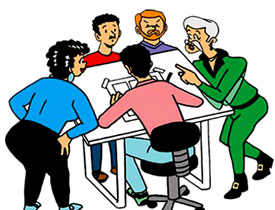
JK: The Jayson strip… Well, what happened to me on Christmas Day in 1982, which I say is the last Christmas I will ever spend with my family - It was not a great day. I was very uncomfortable.
BF: Was this after you came out?
JK: No, I had not come out yet. This was the year I graduated from college. I was really struggling financially. A lot of the first year out of Penn with a Liberal Arts degree, [I] just struggled to get a job and find something that wasn’t menial or something that even required a High School diploma. I discovered too late that a Liberal Arts degree, even from an Ivy League University, it’s a one way ticket to graduate school. It really in and of itself isn’t something you can get employment with. I was the first person in my family to go to college so no one really prepared me for what I was experiencing.
I thought, you go to a good school and you study what you want and someone hands you a job at the end. That’s certainly what everyone’s always told. It’s this goal to get to college and your life is going to be better as a result. And ultimately it was but certainly not in the beginning. I wasn’t prepared to accept the kind of employment that I could have gotten without a degree. Plus, I had student loans to pay. So it was a very frustrating time for me, but at the same time I was writing all this press about how great my life was; how I loved my job; had this whole fantasy life I’d created for [my family] that I knew wasn’t really true. I didn’t want to admit how bad things were. So I came home and things had always been sort of tense. Part of it was all the unspoken-ness.
That Christmas Eve I returned to the basement and just started doodling and 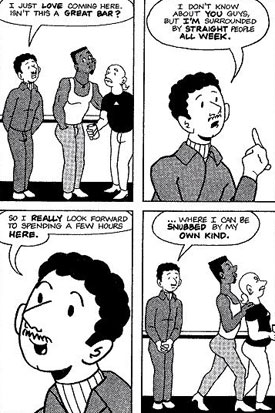 sketching as I always had. As you note, I’m a big Archie Comics fan and I’d always done my own comics as a child. I went to the basement and started sketching out what turned into the Jayson strip. I wrote about my relationship with Andrea Jartman. I did some strips about my relationship with Walter, my ex. sketching as I always had. As you note, I’m a big Archie Comics fan and I’d always done my own comics as a child. I went to the basement and started sketching out what turned into the Jayson strip. I wrote about my relationship with Andrea Jartman. I did some strips about my relationship with Walter, my ex.
I drew back from it and I was laughing – doing that whole tragedy plus time equals comedy thing. Trying to truncate it slightly – Let’s have less time between the tragedy and the comedy. Let’s laugh sooner!
BF: Yes! That’s great!
JK: I thought this is funny. This should be published. I was creating the kind of strip that I would loved to have read, but never saw anywhere. I took it back to Philadelphia and I started drawing it up nice, for publication.
BF: Where did you first try to submit the strips?
JK: The only place I knew that might want this sort of thing was The Advocate. So I contacted them and I think they sent some kind of form letter. They never bit.
We had something that was going strong at the time called The Philadelphia Gay News. It was a local newsweekly, and I took it to them and the publisher really liked it. He liked the idea of having an original cartoon. There wasn’t much of a gay syndication market.
Part 2 – Underground and Over the Top
BF: Were there not really any gay comics when you were starting Jayson?
JK: I don’t think there were. I had never seen one. I think there were some single panel things that had been published.
BF: This was before Leonard and Larry?
JK: Long before all of that.
And I thought Shoot for the stars! Go with something national. And The Advocate existed. I think they had the Donelan cartoons. If not quite then it was shortly thereafter. Before Donelan they had something in the back, except it was all single panel stuff, and I really found myself wanting to tell stories. In fact I took these twelve panel strips to Mark Siegel, who was the publisher of Philadelphia Gay News and he said “can you give me six?” So I took the twelve panels and just hacked them in half, said To Be Continued.
He published it for about a year, but not weekly, just once in a while. Which meant I never really built a following, but I built up enough material. Something else that started happening a couple of years before was this thing called Gay Comix.
BF: An underground comic?
JK: A comic published initially by Kitchen Sink. Howard Cruse was editing at the time.
BF: The creator of Wendel, Barefootz [and later Stuck Rubber Baby].
JK: Yes. Around the time that I sent my stuff in, just sort of anonymously to the publication address… It was published by B.A.R. – The Bay Area Reporter. Howard had left… um… (remembers) Oh! That’s how it was. Kitchen Sink didn’t want to publish [Gay Comix] anymore or something. I don’t know the whole story. Kitchen Sink had lost interest or they weren’t making money, and Howard Cruse left all at the same time. There was this big changing of the guard and the B.A.R. picked it up and they chose Robert Triptow - which turned out to be very good for me because he really liked my stuff. He looked at my panels and said “you should be doing stories. I like the characters. I like where you’re going with this. Try your hand at a story.”
Andrea Jartman and I had just gone to our fifth High School reunion. That became the inspiration for the first Jayson story. I wrote it up and sent it to Robert and he helped me with the editing of it. He showed me how to structure a page. He basically took what I sent him in sketch form and he cut it and re-pasted it together so that it moved faster.
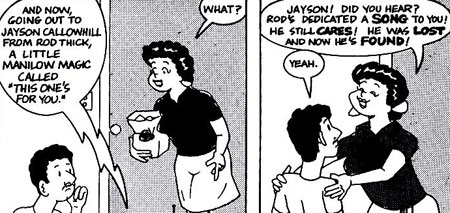
BF: The perception of gays in the media has changed incredibly over the last couple decades. For our readers who weren’t there, what kind of climate were the Jayson strips coming into?
JK: Let me first of all say that I was really blessed, because by the early to mid eighties, when I started doing Jayson, I had a real support system of friends who were straight. When I came out, Penn was really at the forefront of the gay rights movement. I remember I was conducting some interviews about that – people who were really pushing the gay agenda on campus.
BF: In terms of activism?
JK: In terms of activism, in terms of equal rights, in non-discrimination in housing. The faculty, they wanted to create an open and inclusive environment. I kind of naively said “Uh, what are we preparing people for if they go out into the real world and find out they can’t behave this way?”
BF: [Laughter]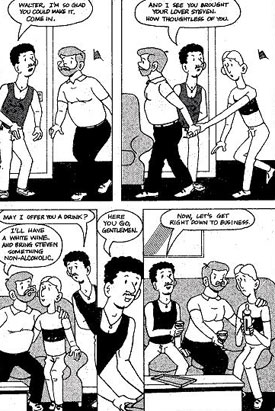
JK: And that wasn’t a very well-received question. I think it was important question to ask, because college campuses were at the forefront of the gay rights movement; still much further than the rest of the country. The downside of that was the introduction of speech codes and political correctness to the point where it amounted to censorship from the left. I always chafed at that.
Other than my friends who were very supportive of what I was trying to do with Jayson not a lot of straight people read what I did. At least I don’t think they did. There weren’t then because it was being published in something called Gay Comix. How many straight people pick that up or even know to pick it up? At the time I was creating Jayson or starting to get it published, I had a roommate who was a big fan of Aline Kominsky-Crumb, her Bunch series. That plus Gay Comix sort of made me aware of the whole underground comix experience. I didn’t really know they existed. I was reading the kid stuff and going to mainstream comics shops, and even if that stuff was in the back room, I didn’t really look for it because I didn’t know it existed.
My own personal climate in creating the strip was a very positive one, except that there was a gay agenda that was far more rigid and left-wing than it is now. I think we’ve embraced a little more diversity within the gay community. I got a fair amount of criticism for my strip because [some critics] didn’t like the way I portrayed gay people.
BF: In terms of their flamboyance?
JK: In terms of Robyn Ricketts’ flamboyance for one; in terms of Jayson being so “wimpy.” – not my word. I always tried to create real characters with real relationships who were really flawed.
The evolution of the strip over time – I got twenty years older and the characters got maybe two years older, and they had different experiences and different journeys in each story. They learn something and that opens up a new possibility. There’s a branch and bound that goes on any kind of serialized adventure like that, where the characters start to be very different from the inspirations for them. I moved to Atlanta, I started graduate school and fell out of touch with Andrea, and the person who was the inspiration for Robyn Ricketts.
In the beginning especially, I kept a file on all the nasty things people said about Jayson – in the gay press, gay reviewers.
BF: What are some of the bad things? Or if you could pick one worst thing?
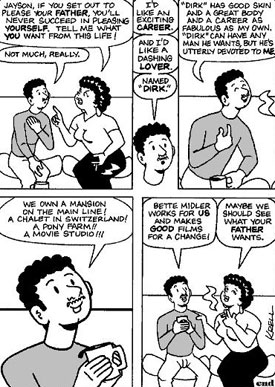
JK: I’ll give you one example. This was never written down except by me. I was on a gay comics creators panel in New York, 1992 or something. They were [hosting] a gay comics collection there in New York at the Gay and Lesbian Center. They had a gala opening and they had a panel of invited guests. Howard Cruse was there, I was there, and Jennifer Camper was there. I had already gotten my MBA then and I was all about “let’s market this stuff!”
Someone asked of the whole panel “what do you think of each others’ work?” and I really expected polite answers. Howard Cruse did the whole politically correct thing about how “it doesn’t really matter what I think. It’s important that everyone gets to express their personal viewpoint in this medium, and if they find an audience for it, it’s worthwhile.”
BF: That’s very diplomatic.
JK: He was very diplomatic and she (Jennifer Camper) wheels around in her chair and the only thing I can remember her saying is “Frankly Jeff, everything you do offends me!”
BF: Wow! Did she ever back that up?
JK: She said “Oh, your female character is fat and she’s Jewish and she’s pathetic. And your LESBIANS! I don’t know anyone like your lesbian character. I don’t live in the world that you put on paper!” and I politely said “Well, I guess we live in different worlds.” That was where I left it. I took the high road.
Part 3 - Onstage and the Next Stage
BROKEN FRONTIER: You took a break from the Jayson strips for a quite a while. What were you working on?
JEFF KRELL: Well, in 1996 I started working on a Jayson musical (with songwriters Ron Romanovsky & Paul Phillips), because I’d wanted for some time to bring Jayson into another medium. My characters – certainly Robyn and Arena are both these showboats who just come into every scene looking like they’re gonna burst into song. I really didn’t think that mainstream television [was] ready for this. It was another five years ‘til Will & Grace came on the air, and I was an outsider. I wasn’t going to be the one to break down that wall.
BF: You were outside of the television industry?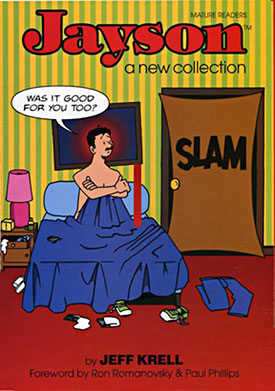
JK: Yeah, completely, but there were a lot of gay-themed shows on and off-Broadway, and it seemed like… First of all it’s cheaper and easier to produce, and I was living in New York. I went to a lot of theatre. Also, I felt sort of obliged to go see a lot of gay theatre and it was all really a downer at the time. It was all, uhh…
BF: AIDS survival stories?
JK: AIDS, AIDS, We All Have AIDS!
BF: [Singing] Everybody has AAAIIIIDS!
JK: Exactly! We were laughing about that the other day. Especially when the Benetton campaign came out after that movie [Team America: World Police] took all that criticism. That was kind of what Broadway/Off-Broadway was at the time. Not all musical-ized, but it was all We all have AIDS and Everybody hates us and We’re all dead at the End - that kind of thing, real uplifting story of hope…
BF: Especially when it’s the status quo.
JK: Yeah, so I said, in wanting to bring Jayson to the stage, that it’s time to laugh again. So I stopped writing the comic strip and focused on the new material that had to be created, to turn essentially what was a bunch of episodes… Couple of things happened: I pulled all of the episodes together to say what would make sense to tell the story on stage.
In the process I said “this should be published in one place” because I was trying to raise money and people didn’t know what the strip was. They’d never heard of it. [If I had said] “well, it was in Meatmen,” that’s not going to raise you money on Broadway. I thought if everything was in one place that we could hand out as a promotion to people we were trying to get money from – [it would] say - This is part of a franchise. This is part of something that exists, and here it all is. That was actually the first thing I ended up self-publishing, the first Jayson collection in 1997. It was intended as promotion for the musical.
captains gear bill gates chatgpt prada black notes gucci e commerce valentine tx prada gucci butik prada luna sport diabo veste prada tod's outlet store the gift by aselin debison lyrics valentine texas prada white prada shades prada rhinestone skirt ios chatgpt app premium instagram followers jazztrax catalina 2016 prada heels sale shop tommy hilfiger outlet online prada bags outlets 300 followers instagram غوتشي prada outlet locations 5k instagram followers prada mens briefcase yacht club uniforms run light up prada skull cap staub cookware outlet tomogachi nude prada bag prada optical prada au купить гуччи what's prada like chatgpt chatgpt free online chatgpt parameters llt academy south bay prada badge chatgpt for business kendall prada prada pumps sale prada watches ladies prada sunglasses women's prada gabardine sneakers can you use eyelash glue for fake mustache silver prada pumps instagram followers 50 delta 12 10 kayak pleasant hawaiian holidays aaa prada arca lyrics beard long goatee bondy blue youtube spiky red fruit prada replacement strap duration terra cotta shingles instagram api followers prada sport shoes lyrics light up light up prada leopard bag how to make a fake mustache with makeup prada heel boots iko impact resistant shingles rosemont restaurants with outdoor seating silicone pregnancy belly silicone pregnancy belly who made prada discounted prada sunglasses prada belt buckle raptor synthetic underlayment manage instagram followers tamagotchi toys prada cloudbuster prada eyewear women bolsa da prada restaurants near 60018 prada womens jeans prada replacement strap prada outlet prices prada taschen prada 1999 repurposed prada necklace chatgpt install fashion outlets online yachting hat premium followers instagram chatgpt app中文 instagram followers analysis prada bag 2005 prada vibram boots pleasant holidays aaa iko nordic shingles prada taschen ugg outlet prices prada repair prada windbreaker mens prada 90s fuzzy prada bag prada sneaker green prada bags nordstroms prada small crossbody www.bananarepublic.com factory who made prada prada milano sneakers gucci buy the mix marketing bulletin board walls burlap colors chatgpt and microsoft
BF: That’s not the new collection…
JK: No, I selected stories that ended up in the script for the show. A lot of the second act had to be written from scratch. Now we know who these characters are, and they’re funny and they say all this witty stuff. Onstage I took them through the whole wedding episode. Act one ends with the wedding day and all that that portends and then act two opens with them marching down the aisle and then the audience is like the audience for the wedding, which worked out really well.
BF: When did this go to stage?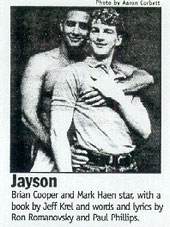
JK: It was produced Off Broadway in the summer of 1998 at the 45th Street theatre, which is the home of Primary Stages. It ran for ten weeks and I hope to revive it some day in Los Angeles.
BF: What kind of reviews did it get?
JK: It got really bad reviews. NOT all. What was interesting is reviewers who didn’t have a lot of baggage and didn’t come in with preconceived notions of what a musical should be (primarily the internet reviewers, who were younger) and just came to see [whether the show is] a good time – we got excellent reviews. The New York Times was actually pretty kind to us. I’m actually proud to say the New York Times came and reviewed it. They weren’t mean to us. They didn’t like the music of all things. They sort of liked the script. They thought some of the material was strong and translated well to the stage. They loved the cast, so I was pretty proud of that at least! I know my characters and I know who would be good to bring them to life. A lot of the other mainstream papers were really unkind to us and so was the gay press, for different reasons. What it really was, was a sitcom with music. It was still sort of episodic and it was like here’s an episode and here’s a song to go with it. Taken on these terms I think it worked, but if they were looking for a traditional musical, they weren’t going to find it.
It was an amazing experience.
BF: How did you return to the comics medium?
JK: I started writing screenplays. I moved to Los Angeles. Only a couple of years ago, when we started coming to the Con…
BF: 'We' meaning...?
JK: My partner Bud and I, at first just as tourists – because I love the comics medium and I’d gotten away from it for a while. I just got so excited again. Seeing what’s out there and seeing people creating and wanting to be part of that again. We have all this material that a whole generation doesn’t even know about anymore and I wanted to tell the stories. I wanted to bring Jayson into the new millennium. There’s so much more to tell. There’s so much more to say about where we are as gay people today.
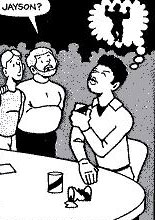 ___________ ___________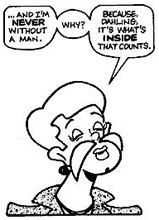
BF: How do you view the older Jayson stories in today’s [more gay-tolerant] milieu and what kind of challenges does [the current climate] present?
JK: The first thing I say, with justifiable pride, is that the Jayson stories have stood the test of time. The current reviews seem to indicate that we’re vindicated that way. A lot of the stuff that I resisted in terms of characters being cardboard political cutouts mouthing a certain viewpoint - the critics of the day were saying “this strip is terrible because it doesn’t do those things. It doesn’t represent gay people the way we want gay people to be represented to the straight community!” [That] was never my agenda. My agenda was first and foremost to entertain, and to do that with three-dimensional characters with relationships that were fun, building conflict and telling a story. The stories hold up. I wasn’t intentionally targeting the mainstream audience, although there’s not a lot of sex or naughty parts.
BF: A few curse words here or there.
JK: Words, certainly, because my characters speak the way my friends speak. They look like Archie, but they don’t talk like Archie.
Let’s put it this way – when Will & Grace came on the air, my friends who had followed the Jayson saga for fifteen years said “they stole your strip and they called it Will & Grace.” So, I’d like to believe that I was ahead of my time when I was doing it. In part because I wasn’t trying to target a mainstream audience and I’d assumed I was never going to achieve that anyway. So the audience has changed and has come around to being more accepting of the kind of material I was doing fifteen years ago. I look back and I laugh.
There’s some updating that has to be done to bring the characters into the new century. They would have a computer now.
BF: Cell phones were not really a thing in the 80s… Are there any clues about your future plans for Jayson?
JK: When I produced the Jayson musical, I worked with a number of young (18-22)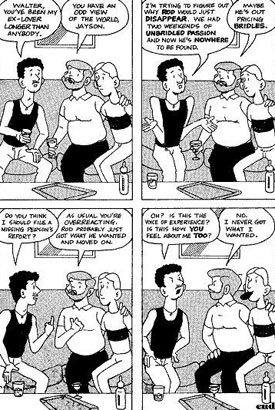 gay and straight kids - and the one thing that surprised and pleased me is how little self-loathing there was among the gays and how casual it all seemed to the straights. This is an astounding shift that needs to be reflected. Robyn, of course, will always be a queen of a "certain age" for whom self-loathing is an artform (along with other-loathing) but I foresee some healthy growth for Jayson in this arena (pun intended). gay and straight kids - and the one thing that surprised and pleased me is how little self-loathing there was among the gays and how casual it all seemed to the straights. This is an astounding shift that needs to be reflected. Robyn, of course, will always be a queen of a "certain age" for whom self-loathing is an artform (along with other-loathing) but I foresee some healthy growth for Jayson in this arena (pun intended).
I don’t want to give Jennifer Camper an inch, but my inspiration for the Portia character in the strip – I’d created a story called Jayson Dykes it Out, that introduced Portia. My experience with lesbians up until that point was a pretty negative one. The lesbians I knew were lesbian separatists – a philosophy I have never agreed with, and I think has NOT stood the test of time. Men were the enemy even if they were gay men, because they were still men. They were still the oppressors.
I was running Lesbians and Gays at Penn, and the lesbians had to have their own group, because they needed their space. But they also had to be invited to the gay group because it would be discriminatory [not to invite them]. We couldn’t have an all-male group, but we had to have an all-female group and we had to pretend that all of this was just fine. I just got tired of we need our space. I was taking that on when I created the Portia character. I didn’t make Portia evil. She has an evil ideology. I have some plans for Portia, I won’t disclose them because it’s actually kind of a big surprise, but I will say this much – She’s changed her tune!
BF: So, where can we find the new Jayson comics?
JK: Right now, only in my head. I’ve written out several story arcs, planned out the first twelve issues and each set of four issues would then become a new collection in the Jayson saga.
Original Interview:
Part 1
Part 2
Part 3
|
